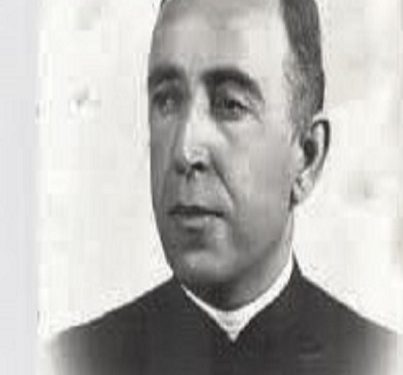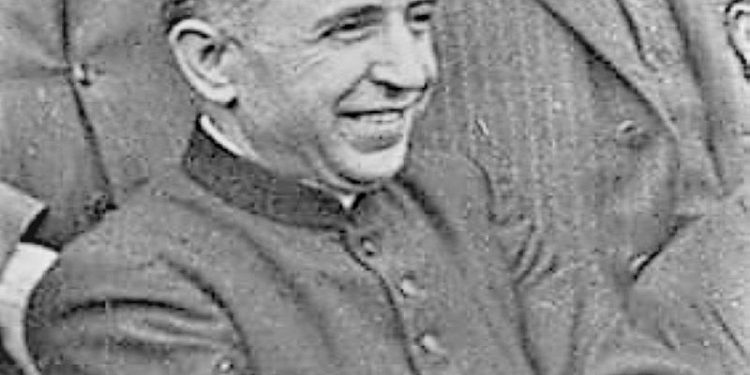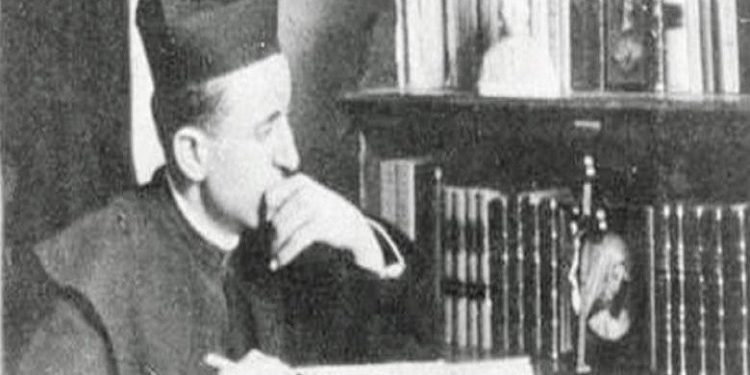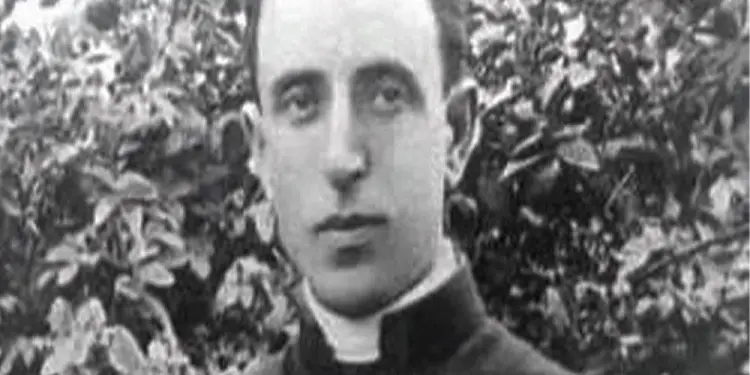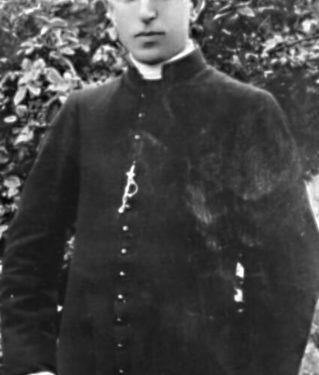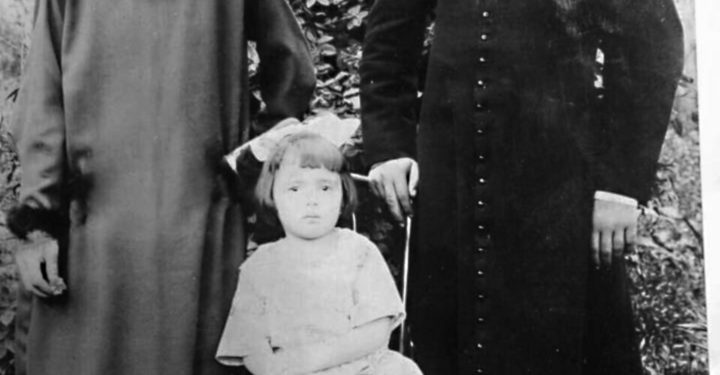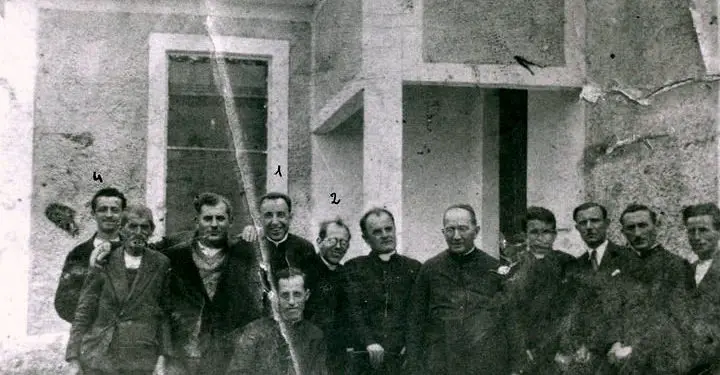NIKOLLË LOKA
Av. ALFDRED DUKA
NIKOLIN KURTI
The twelfth part
WHY DOES THE POLITICAL ACCUSATION OF COLLABORATION NOT STAND?
-Continuing the tradition of native Catholic clergy –
Cooperation for the state and only in its interest
Decision of the Court
Memorie.al / But at the end of the trial, by decision of the Tirana District Court (Military), dated 17.4.1947, Dom Shtjefën Kurti, based on articles 3.7 paragraph 8 – 9 – 10 of Law no. 372, was sentenced to 20 (twenty) years of forced labor imprisonment and the loss of civil and political rights for 5 (five) years. The newspaper “Bashkimi” of April 18, 1947, commented on the decision of the Military Court of the Tirana Garrison, announcing their “guilt”, according to it, with “a few of the things the suspects said and a few of the things they attributed to each other “.
DECISION OF THE DISTRICT COURT OF TIRANA (MILITARY)
By decision of the Tirana District Court (Military), dated 17.4.1947, since his activity is considered a crime, from article 3.7 of para. 8,9,10 of law no. 372
THEREFORE
For all these together and in opposition to the request of the Prosecutor, based on Article 4 of the aforementioned Law;
DECIDE:
The guilt of the culprit Dom Shtjefen Kurti and his punishment with twenty (20) years of deprivation of liberty, forced labor, the loss of civil and political rights for five years.
The punishment starts from the date of arrest.
This decision was given with the right to challenge and was declared on 17/4/1947
The court costs are charged to the convicted person. (6)
Secretary Chairman
Ilia Xheka Major Gjon Banushi
Members Lieutenant Rushit Kananaj and Vasil Karajani
The accusations were simply related to his religious activity, to his work as a cleric and not to any particular political or military commitment outside of the profession. Shtjefën Kurti, in the investigative and judicial process, had openly expressed his democratic views on political changes in Albania. From the conversations he had with representatives of foreign missions, he learned that: “free elections would be held and after them there would be freedom of thought”. Believing that Albania would transition to democracy, he was committed to preparing his believers for the political developments that were expected to happen, committing to the democratization of politics and society, but he had never participated in the organizations that preached violence. As a priest, he had remained faithful to his peaceful mission, but had never hidden his convictions and peaceful political activity.
Kurti had also called the presence of a Christian Democratic Party in Albania, within the framework of the multiparty system, positive in the trial. He remained faithful to his conviction that changes in society should express the will of its majority. Kurti was not punished for having broken the laws of that time, but for having worked sincerely in their implementation, while the new officials in power had issued many of the laws for propaganda purposes, but in practice acted against them. Dom Shtjefni is presented as a great fighter for religious and political freedom and for political changes without violence.
Other relevant operational data
On November 15, 1952, when he was serving his sentence in Burrel prison, Dom Shtjefën Kurti was interrogated to give clarifications regarding the charge for which he was convicted. In the questions that were addressed to him, as well as to the nun Gabriela Prenushi a year later, it appears that the security agencies were receiving information about the clergy, including those who had been convicted by the court and were serving the sentence.
Investigative session of the prisoner Shtjefën Kurti
Today, November 15, 1952, a Saturday, the prisoner Shtjefën Kurti, the son of Jaku and Katerina, a Catholic priest by profession, imprisoned for hostile activity against the government, is being interrogated.
The questions addressed are answered as follows:
Question: When General Hudson of the English Mission came, which of the clergy met him?
Answer: I and Monsignor Prengë Dushi have met with General Hudgson, other clerics have not met with him, but they have seen him when he came to the Hutsoni parish. The clerics who have seen him are:
Dom Luigj Gashi in Gurzë Krujë, Dom Frano Ilija in Rreth Krujë, I remember that Dom Luigj Gashi was the translator.
Question: Did you return the visit to Hudson and which of you went on this visit?
Answer: We returned the visit to Hudgson, and Monsignor Preng Dushi and I, Dom Shtjefni, were on the visit, while other clergymen were not present on the visit, but they knew about the visit we made, Pater Gjardi in prison, Pater Senti in Italy, Father Mashkalla in Burrel prison and Father Filice Kieza, in Italy.
Question: When Colonel Palmer and Major Smith came to the parish, who did they meet with, besides you?
Answer: Colonel Palmer and Major Smith came to the parish in 1945, in February or March, I don’t remember exactly. Only I met with Palmer and Smith, and Dom Anton Zogaj is also aware of the meeting that I had, and today he died.
Question: When Jacobs and Anton Stevens of the American Mission came to your parish, who among you met with them?
Answer: Jakobsi and Stevens of the American Mission came to the parish on the Christmas days of 1945. Only I met with them, but I also told Dom Anton Zogaj about the meeting I had with them.
Question: When you returned the visit to Jacobs, which of you went to visit?
Answer: I returned the visit to Jacobs after 10 days. I went alone, but I also told Dom Anton Zogaj and Monsignor Prengë Dushi about the visit I made to Jakobs. I visited Jakobsi one more time, but I was alone and I didn’t have anyone else.
Question: Did you ever meet Fultz and did you ever send him a letter?
Answer: I have never met Fultz. I only sent one letter to Fultz once. I don’t remember why I sent you this letter, about which only Rrok Oboti knows, to whom I gave the letter about Fultz.
Question: Do you know which of the other clergymen are related to Fultz?
Answer: I don’t know of anyone else who is related to Fultz.
Question: When did you know the President of the Mission Françez Vizdorf and who else among the clergy has a known background or connection with them?
Answer: I met Vizdorf in 1945, when he came to the parish together with Vili Brut, also a Frenchman. When I came to the Parish, Anton Dukagjini was also with me. Vizdorf came one more time in the spring of 1945 to the Parish and visited Monsignor Prenuš. In the same way, Vizdorf also paid a visit to the House of Jesuits – Monsignor Frano Gjin.
Question: At what time were the letters sent to the Vatican by the French Mission and who among the clergy knows about these letters that were sent to the Vatican?
Answer: I sent the letters to Dom Shtjefni in 1945 and the following are aware of the sending of these letters: Monsignor Prenushi, Dom Zogaj, Dom Thaçi, Dom Gjinaj, Father Meshkalla, Father Gjardi, Father Santi, Dom Frano Ilija, for I don’t remember the others. I also sent a letter in 1946, three or four days before I was arrested by Agustin Bonati. Dom Anton Zogaj and Monsignor Bonati in prison are aware of this letter. I don’t remember well if I even told Dom Mark Showers. The content of the letter was about the closing of schools, the nationalization of schools, the secularization of schools, about the arrests and executions that the government had made among the clergy and others.
Question: Where did he get the $7,000 to send to Nigris?
Answer: The dollars Nigris gave me, as far as I know, he got them from the Vatican?
Question: In what year did Nigris give you the 7000 dollars?
Answer: Nigris gave me the dollars before he left for Italy. But I don’t remember whether it was at the end of 1945 or at the beginning of 1946.
Question: Who knows about the dollars Nigris gave you?
Answer: Monsignor Prenushi and Dom Anton Zogaj know about the dollars that Nigeria gave me.
Question: When you collect these dollars, so as not to give them to the state, which is behind the knowledge of the clergy?
Answer: Regarding the management of dollars from my side, at the time when the House of Nuns was nationalized, we found out that I was the manager of money in the house of Servite Nuns, Prenushi, Zogaj, Dom Mark Dushi, Dom Zef Bici are aware of this priest Petraq in prison, Pashko Prela, Gjyltrude Toma, Sister Agostina, Sister Mikelina, Rrok Oboti, Nush Prendi, etc.
Question: When did you meet the American woman Mary and who else among the clergy did you meet?
Answer: I met Mary at Easter 1945. I also received a bicycle from her with a receipt. The nuns are also familiar with Mary; I don’t know anyone else who has met Meri. Dom Mark Dushi also knew about the bike I got from her. When I was arrested, I left the bicycle in the Parish.
Question: Did you have a radio in the parish and what stations did you listen to?
Answer: We have a radio and we used to listen more often to Radio Bari, Radio London, and Radio America, in addition to Radio Vatican.
Question: What else do you have to say about the questions you were asked?
Answer: I have nothing else to say, but what I have said is true and I sign it with my signature.
Prisoner Investigator
Captain Kurti First Captain, Maliq Jaupi
Investigative session of the Gabriela Prenushit procedure, with the prosecutor, Major Rasim Dedja
Question: Tell us what you know about the priests of the Parish of Tirana where you live?
Answer: In 1946, when the Servite Assembly in Tirana closed, Dom Shtjefën Kurti took us to the Parish of Tirana. I (Gabriela), nun Gjyltrume Suma (died in 1950), Mikelina Demiri, who came to Shkodër three years ago, went.
Question: Who did you find in the Parish of Tirana?
Answer: Parishioner Dom Shtejfën Kurti, Secretary Dom Mark Dushi, while Dom Zef Bici, came to the Tirana parish when Dom Shtejfën Kurti entered prison. I forgot to say that Dila Kurti, who lives with the priests and served them, came with us nuns in the Parish of Tirana.
Question: Tell us what you know, why is Dom Shtjefën Kurti imprisoned?
Answer: As far as I know, Dom Shtjefni is in prison because he was a friend of Jakomon and, on the other hand, because Dom Shtjefni has behind him a quantity of American currency, dollars, and a part of which was later taken by Dom Anton Zogaj, who, was shot and the rest was discovered and taken by the government. The money was stolen by our mother, Gjyltrume Suma, but we also knew where this American money was hidden. I also know that when they put Dom Shtjefën Kurti, Dom Mark Dushi and Mikelina Demiri in prison, they burned all those letters in the Parish, why were they afraid. Dom Marku told us that as soon as he found these letters, we will go to hell (we will be imprisoned).
Question: What do you know about Dom Mark Dushin?
Answer: Dom Mark Dushi is an enemy of today’s government and he wants this government to cease to exist and expects the situation to change every day. Dom Marku and other priests have also introduced us to hatred for the communists, who presented us as irreligious and told us to the nuns that: “the communists have burned nuns”. We were afraid of the communists lest they burn us. Dom Marku, Dom Shtjefni, etc., said that: “these are ignorant people, who kill and cut, etc.” From the lame old man (Monsignor Benardin Shllaku), to the last priest, they do not want this power and, as I said, they are waiting for the power to fall.
Question: Besides Dom Mark Dushi’s hatred of the regime, what else do you know about it?
Answer: With Dom Shtjefën Kurti and Dom Mark Dušin, there is an American woman named Meri. This Meri supposedly came to us to sew clothes, but met with Dom Shtjefa Kurti and Dom Marku, where Gjyltrude Suma played the main role. They used it to hide themselves.
Question: Did Gjyltruda Suma meet Meri?
Answer: Marta Doda, who is now in prison, informed Gjyltrude Sumë Meri. This Marta did her best to connect the clan (Dom Shtjefa and Dom Mark) with the foreign legates. As far as I know, this Marta and later her daughter Frida had to do with the French Legation and earlier with the English who were in Albania.
Question: What do you know about the relations that priests or nuns have with the English and the French legate?
Answer: I know that Dom Shtjefën Kurti and Dom Marku, through Gjyltruda Suma, received many food items from the English, such as meat boxes, cocoa, chocolate, anti-pastry, honey, sugar, etc.
Question: Did nuns or priests receive money from the English?
Answer: I know that the English also gave money to Gjyltruda Suma, and Gjyltrudja gave most of this money to Dom Shtjefë Kurti and sometimes also to Dom Mark.
Question: How did Gjyltrude Suma get in touch with the English who were in our country?
Answer: Gjyltrudja initially contacted the English through Marta Sadedini. Then the English came several times to our Parliament. I know three cases that I have without myself. The first time five people came and with them they (were ambushed), Gjyltrude Suma and Mikelina Demiri (the second time four people came). This time, too, I brought them coffee. The third time they informed us through Marta that they would come to visit and four people came. Gjyltrudja (Madre) and Mikelina (secretary) waited for them this time as well.
Question: Do you know what conversations took place between the English and Gjyltrude of Michelina?
Answer: Gjyltrudja spoke to them in English and they said that I didn’t know this language, I couldn’t understand what they were talking about, but Gjyltrudja tells us that the English said that this situation will change, so don’t get upset.
Question: Did Dom Shtjefni and Dom Marku know that the English came to the nuns?
Answer: The posse knew because Gjyltrudja, who was in front of me, informed them. Dom Shtjefni had asked that when they come, enter through the back door and take whatever they give them!
Question: Have Dom Shtjefni and Dom Marku ever met the English?
Answer: They never met in our assembly because they were afraid.
Question: Apart from the English, who did the nuns or priests deal with?
Answer: In addition to the English, they also deal with an American woman whose name was Mary. This Meri came to the Assembly of Servites (to us) with that Marta Sadedi, supposedly to see some children that the Americans were carrying.
Question: Did Mary often visit the nuns?
Answer: Yes, almost once a week the first groceries would come and go. He brought less food than the English. America had days since we had seen hidden Americans, which Dom Shtjefni had mentioned in our presence and that of Dom Mark.
Question: Do Dom Shtjefni and Dom Marku know Mary?
Answer: I know that in our Assembly Dom Shtjefni and Dom Marku have met 3-4 times. In addition to that i.e. meetings with us, Dom Shtjefën Kurti and Dom Mark Dushi have also met with Mary in the church, when she supposedly came to be forgiven.
Question: What did Meri and Gjyltrude and Dom Shtjefën Kurti and Dom Mark Dushin talk about?
Answer: Meri knew Italian and they spoke in this language both with Gjyltrude and Mikelina, as well as with Dom Shtjefni and Dom Marku. I know that Dom Shtejfni and Dom Marku complained to this Merit about the difficult situation created by the communists. She lamented their plight and gave them hope that the situation would change soon. Mary especially felt sorry for Dom Marku, because she was beautiful. I remember that once Dom Shtjefni took us, Gjeltruda and me to Meri, who lived in a beautiful house on the street of Elbasan, to give him an order to come to us the next day. He instructed us, that if anyone asks you, when you leave the house where Mary lived, why we had gone there, to answer that we went to get work, that we embroider the nuns. We mourned, but we didn’t find Mary and we were met by two men, whom we told that Dom Stejfni had orders for us, and after a while we left. Gjyltrude Suma, Mikelina Demiri and I (Nusha) burned a large amount of documents that were in the Parish. Dom Mark Dushi ordered us not to sing these documents, allegedly because he was afraid that the communists would come and destroy them, and then he said “the river took us”.
Question: When did Dom Zef Bici come to the Parish of Tirana?
Answer: Dom Zefi came to the parish of Tirana, after the arrest of Dom Shtjefën Kurti, as an assistant to Dom Mark Dushi. I forgot to say that, before the Party entered, Dom Lazër Shantoja talked to Dom Kurti to keep a quantity of documents. Dom Shtjefën Kurti comes and tells Gjyltrude Suma to hide these documents in the Assembly of Nuns. Gjyltrudja showed me this. Dom Lazri himself came to the assembly and told Gjyltrude that: keep those spoils for me, because I am leaving. I won’t go abroad, because these communists don’t last long. When Dom Lazër Shantoja was arrested, Dom Shtjefën Kurti came to our Assembly and told Gjyltrude and the rest of us to burn all documents of Dom Lazr, and Gjyltrude Suma, Mikelina Demiri, Agetina Ndreca did. I have parties with small children, but I have not burned them. Dom Shtjefni also came a while ago, when the documents were being burned.
Question: What documents were those of Dom Lazri that were burned?
Answer: I have not seen them, but according to what the nuns who burned these documents told me, they were documents against communism, but I don’t know how long.
Question: After the arrest of Dom Shtjefën Kurti, did Marta Sadedini continue to come to the Parish?
Answer: Even after the arrest of Dom Shtjefën Kurti, Marta Sadedini and her daughter Frida, who were meeting with Dom Mark and Dom Zef Bici, came to the Parish. They often came to the priest, almost once a week, and rarely came to the nuns without us.
Question: What other Italians does Dom Marku or Dom Zefi have to do with?
Answer: Many Italians came to the priests before they left for Italy, but I do not know who they are. I know that more of these Italians have spoken with Dom Shtjefa Kurti, Dom Marku and, at one time, with Dom Zef Bici. They complained about the communists and begged them that when they go to Italy, they would present the situation that has been created for the Catholic Clergy and the Catholic religion. I don’t know that any of the Italians gave them letters.
Question: After the Italians fled to Italy, did other Italians come to the Parish to the priests?
Answer: After the last Italians left for Italy, some Italians came to the priests, especially an Italian who was married to a hospital nun named Suorë Terezja from Gurëzi. This Italian seems to me to have worked as a mechanic and for 4-5 months he disappeared and it is not known if he went to Italy or to Yugoslavia. They will remember things that I did not tell them about, I will tell them later.
What was said above, after being read to me, I certify it with my signature?
Processed
Gabriela Prendushi Major Rasim Dedja
It is proven to be the same as the original. Memorie.al
Operative worker
Major Cesk Shoshi
Tirana 19/10/1953




